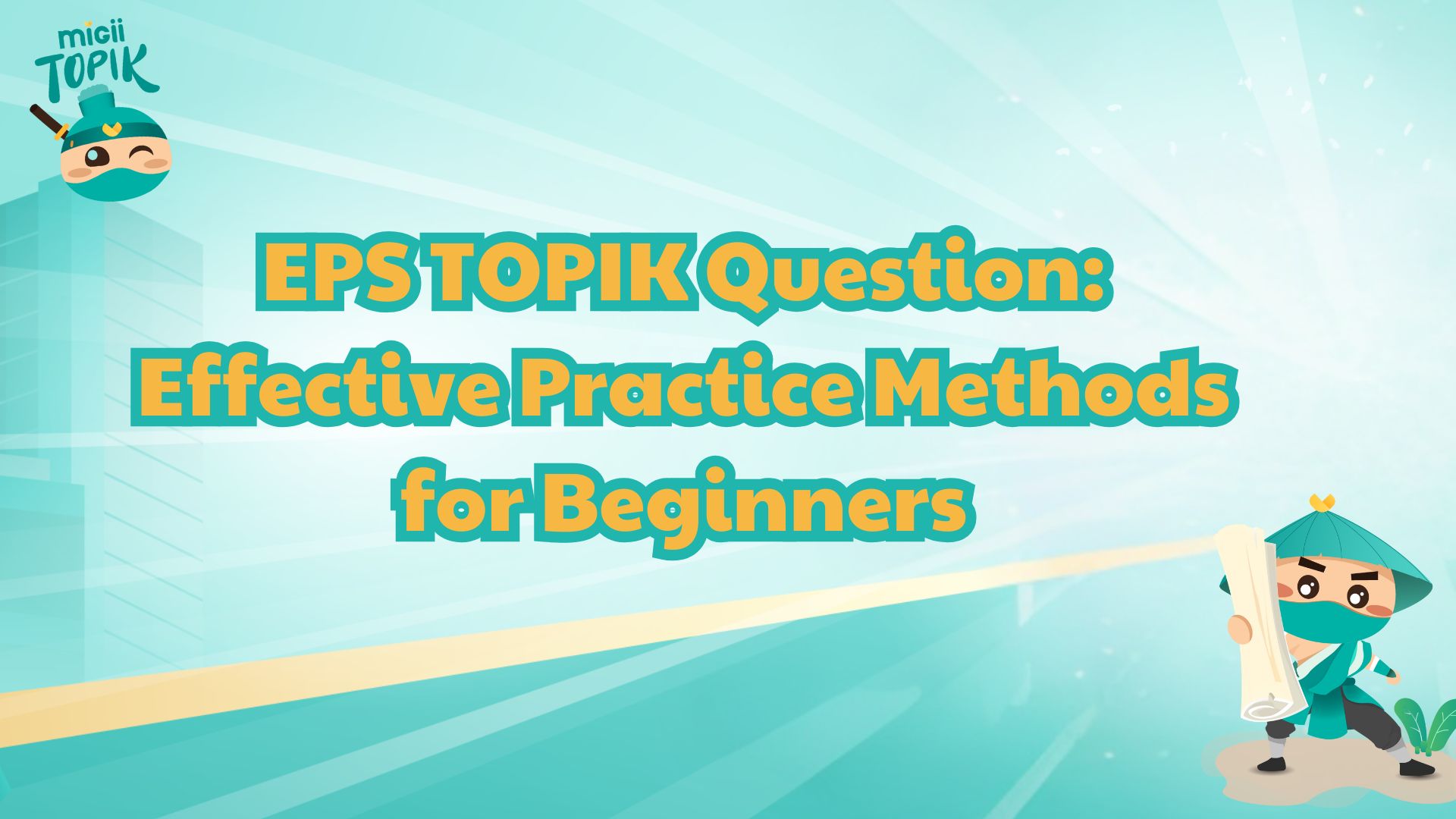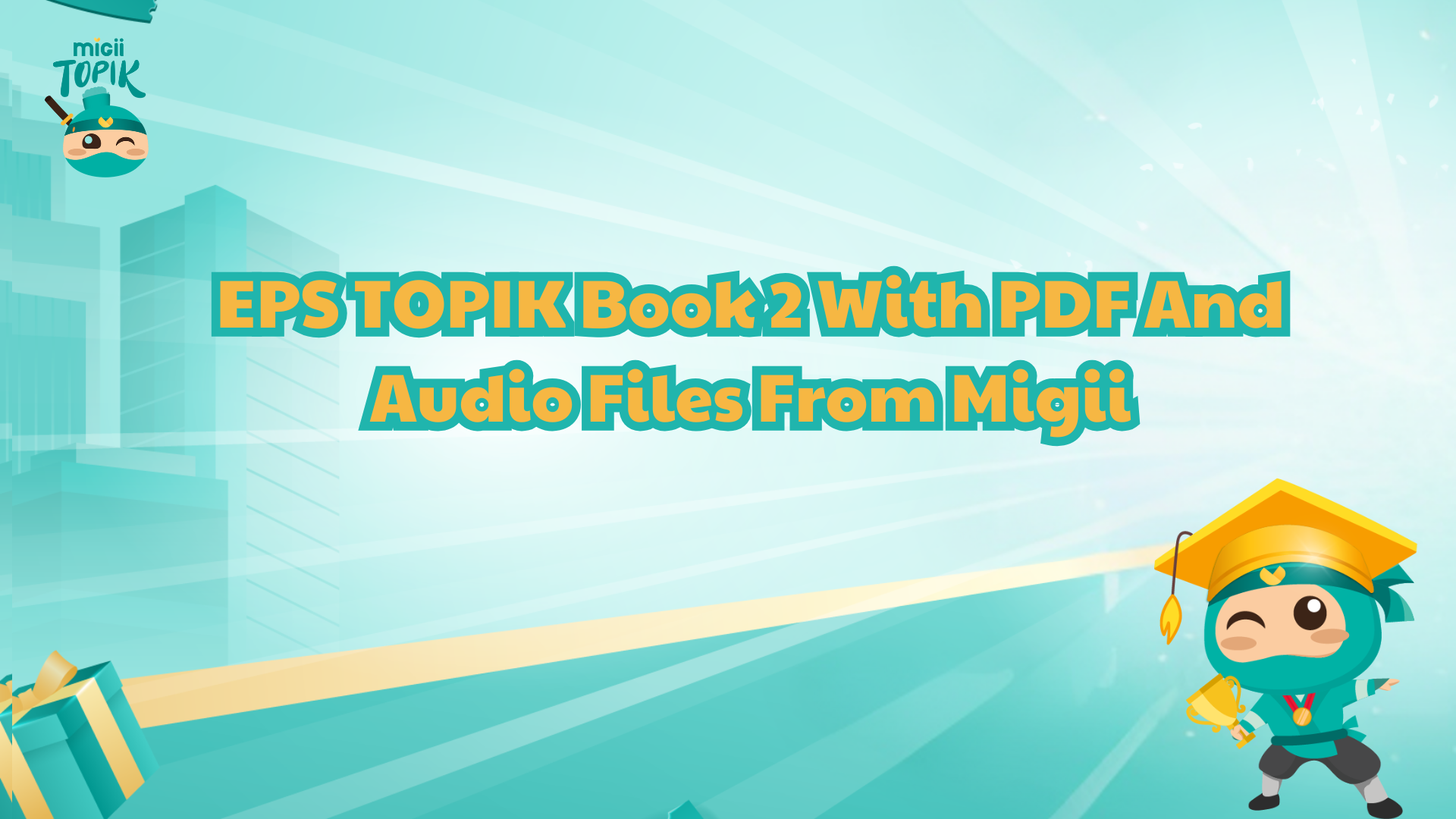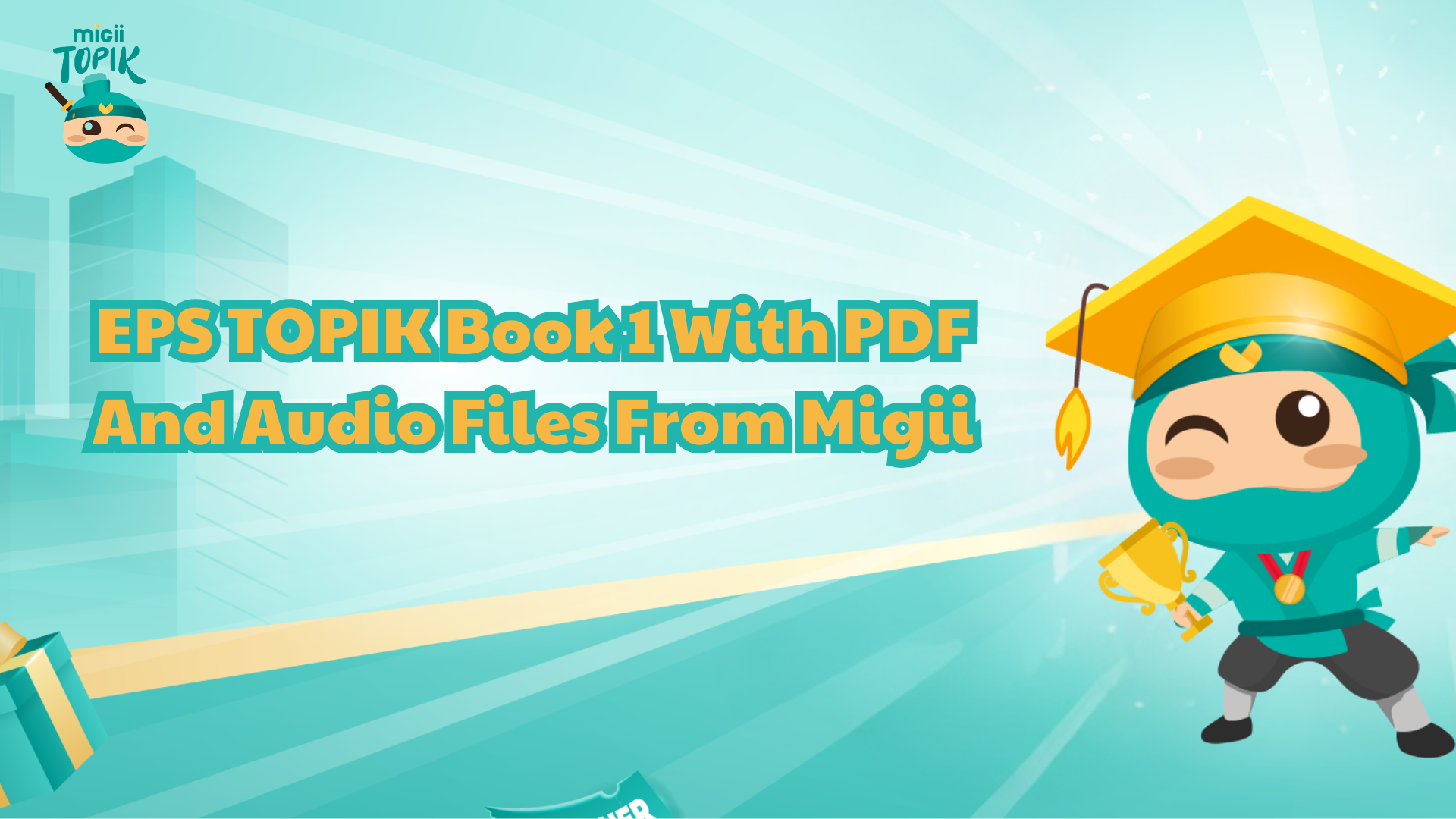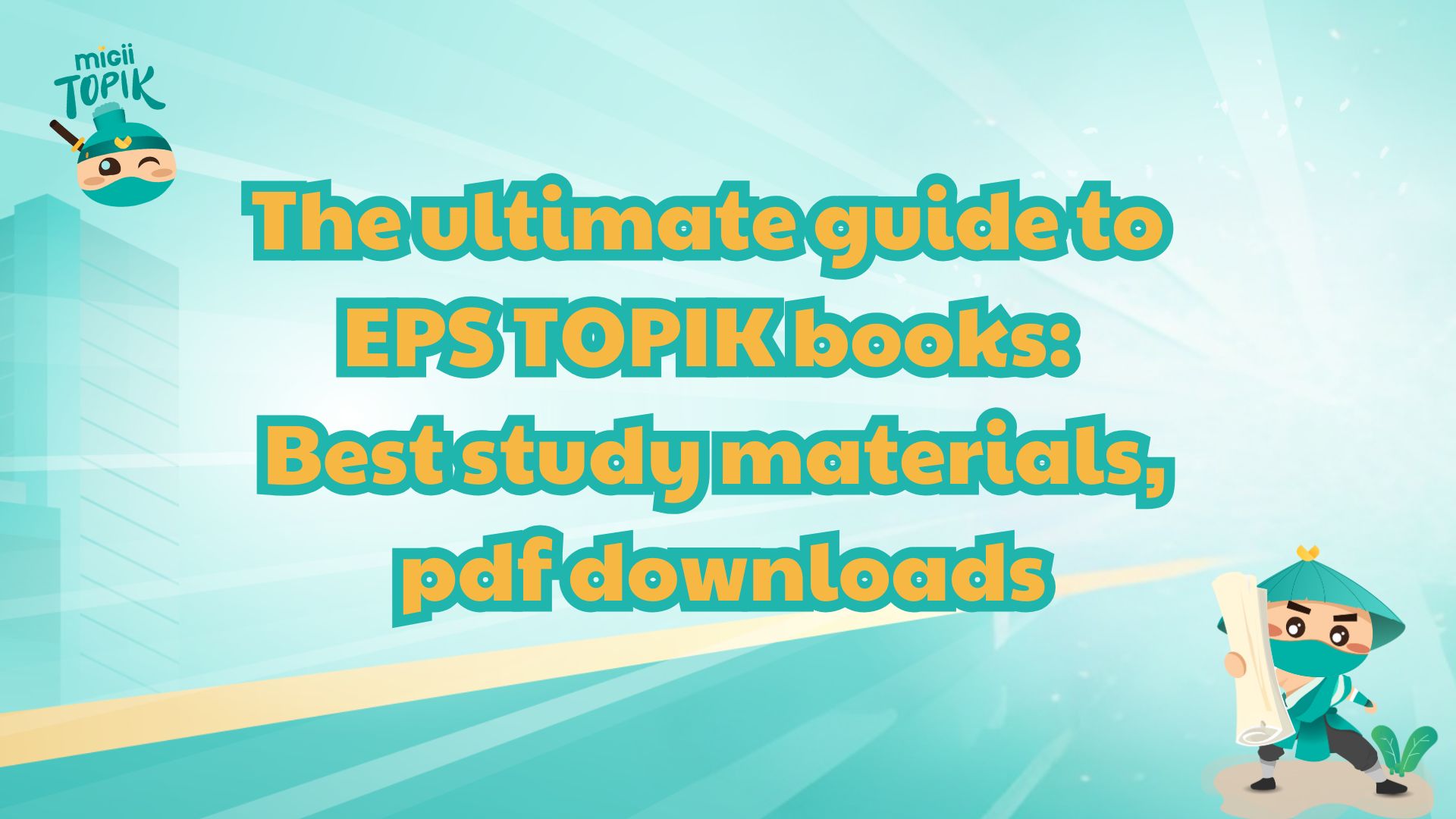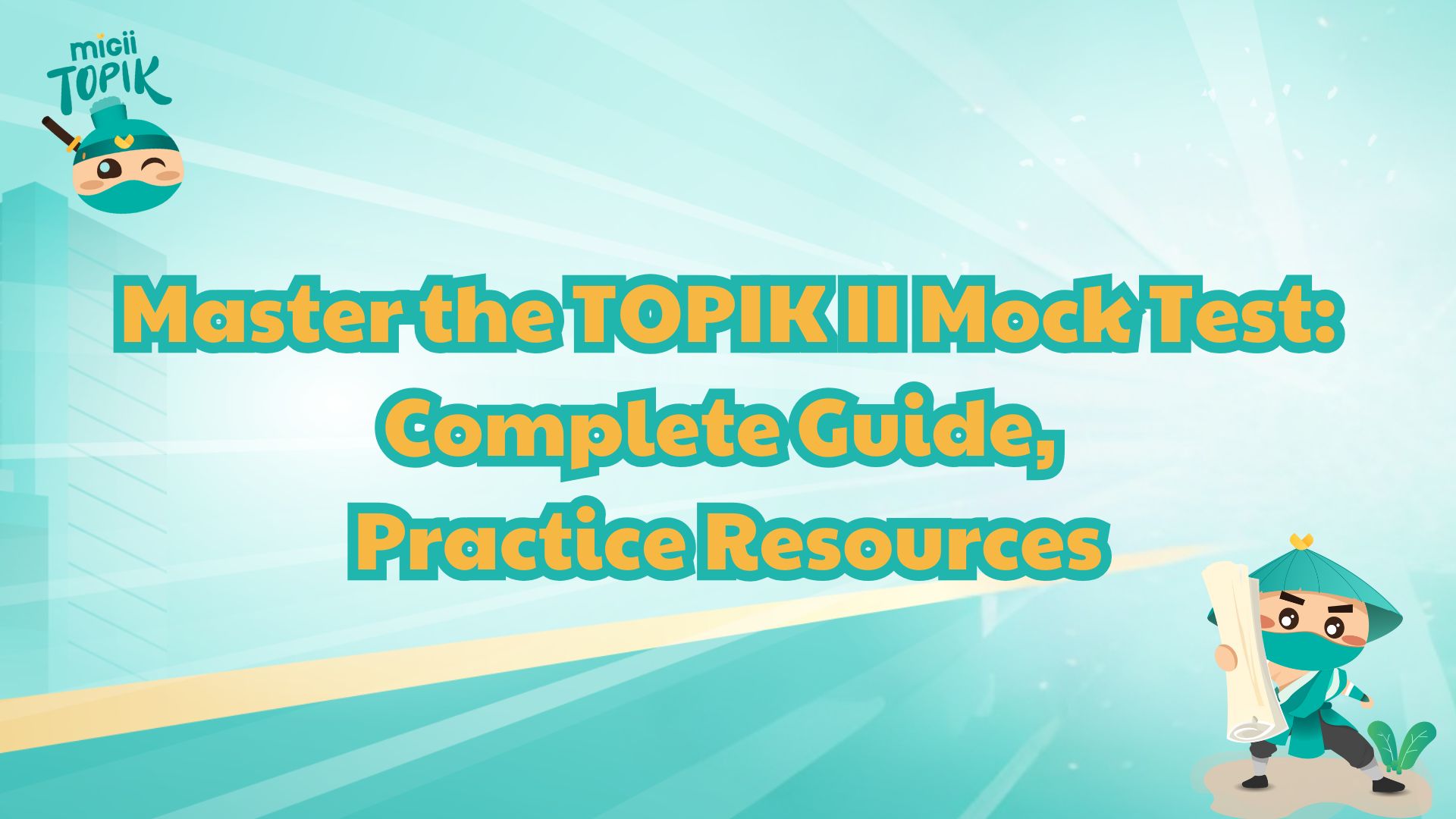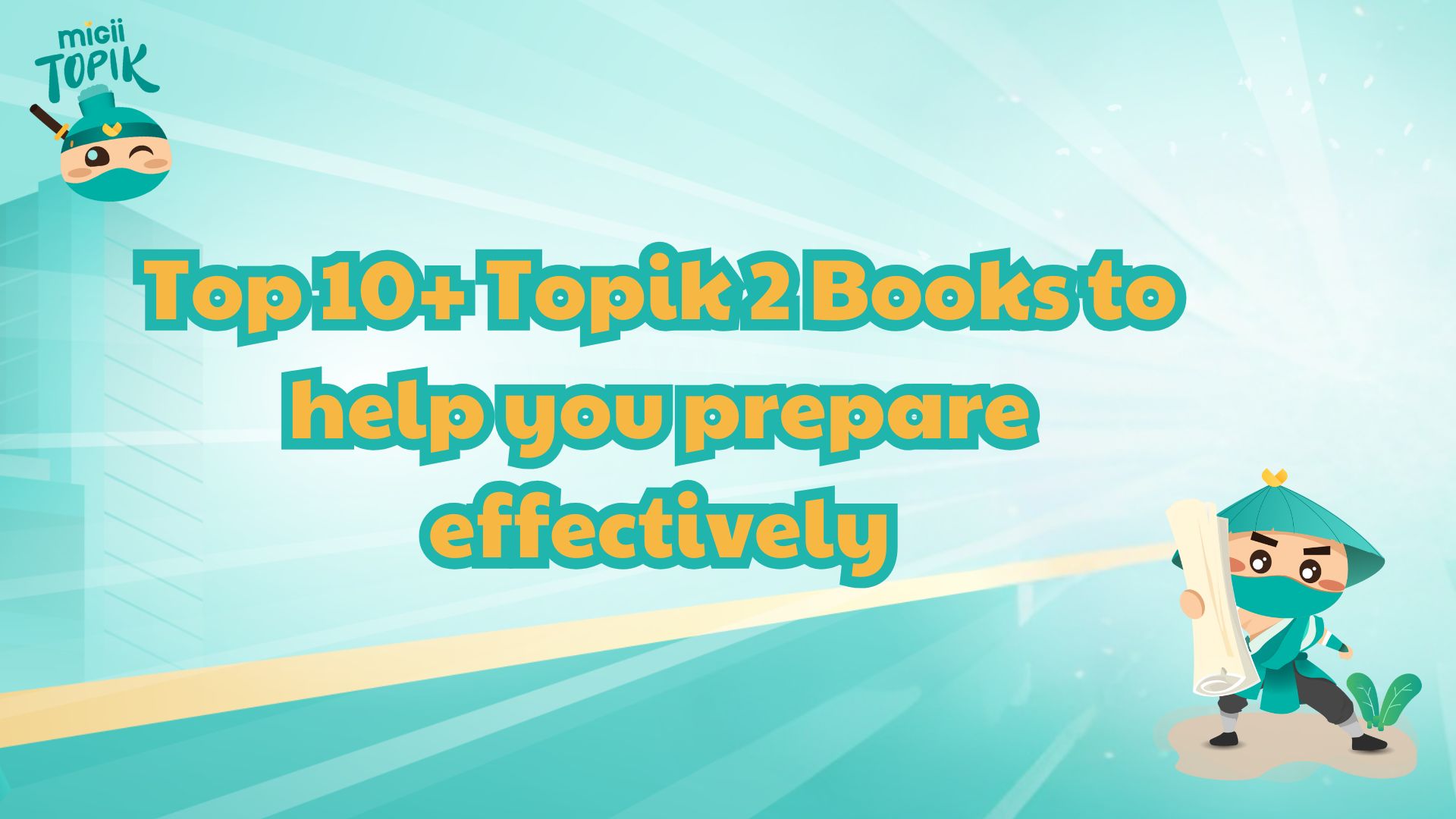Choosing the right TOPIK vocabulary book can make all the difference in your Korean learning journey. Whether you’re preparing for the beginner-level TOPIK I or aiming for fluency in TOPIK II, mastering vocabulary is the key to boosting your reading, writing, and listening scores. In this guide, we’ll explore over ten of the best TOPIK vocabulary books with insights from Migii, helping you find the perfect resource to match your goals and study style while making your preparation more effective and enjoyable.
What is a TOPIK vocabulary book?
A TOPIK vocabulary book is a focused study guide that helps learners master the essential Korean words commonly tested in the Test of Proficiency in Korean (TOPIK). Unlike general Korean textbooks that emphasize grammar and conversation, these books concentrate specifically on vocabulary building, often organizing words by frequency or topic such as daily life, school, or society. Many also include meanings, example sentences, and short exercises to help reinforce memory and understanding.
For anyone preparing for TOPIK I (levels 1–2) or TOPIK II (levels 3–6), a vocabulary book serves as a practical roadmap to success. By studying with one, learners can expand their word knowledge efficiently, improve reading and listening comprehension, and gain confidence when encountering real test questions. For a structured and effective learning plan, following a topik guide vocabulary approach can help you organize study time and focus on the most frequently tested words.
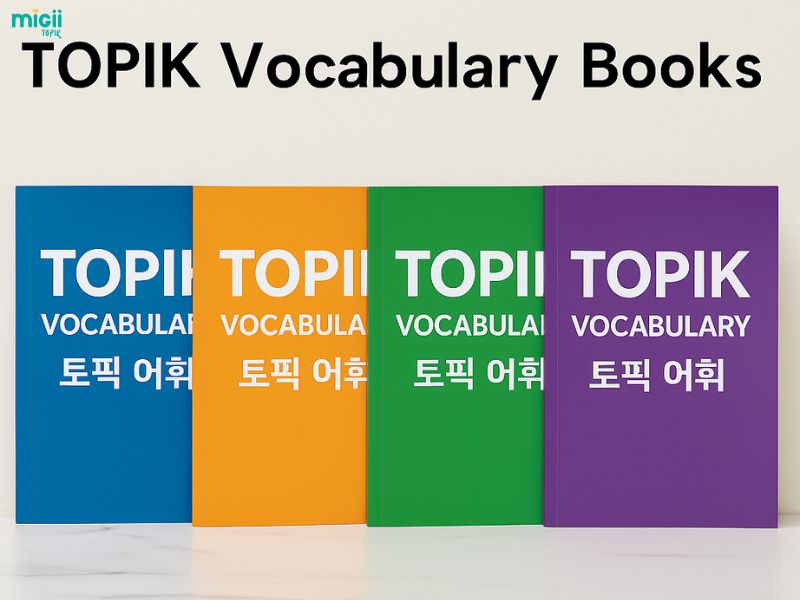
A TOPIK vocabulary book builds essential Korean vocabulary for exam success
How to choose the tight TOPIK vocabulary book
Choosing the right TOPIK vocabulary book is essential for effective preparation and steady progress. Here are some key points to help you make the best choice:
- Choose according to your level: Beginners preparing for TOPIK I (levels 1 – 2) should start with books that focus on basic and everyday vocabulary, while learners aiming for TOPIK II (levels 3 – 6) should look for advanced books with academic or thematic words.
- Pay attention to book format: Pick a style that suits your learning habits. Visual learners may prefer color-coded lists or pictures, while those who enjoy interactive study can try digital options like the Migii app with flashcards and quizzes.
- Check for example sentences: Good vocabulary books provide sample sentences or short passages showing how words are used in real contexts.
- Focus on consistency: Study a few pages every day, review older words regularly, and practice using new vocabulary to build long-term retention.
- Look for exam relevance: Choose books based on real TOPIK word frequency lists or those aligned with past exam trends to ensure efficient learning.

A TOPIK vocabulary book builds essential Korean vocabulary for exam success
Best TOPIK vocabulary books for TOPIK I (Levels 1 – 2)
If you are just starting to learn Korean or preparing for TOPIK I (levels 1 – 2), these beginner-friendly vocabulary books will help you build a solid foundation with essential words frequently used in daily life and on the exam.
2000 Essential Korean Words for Beginners
This book is one of the most practical resources for learners preparing for TOPIK I (Levels 1 – 2). It introduces around 2,000 essential Korean words that frequently appear in beginner-level textbooks and the TOPIK exam. The vocabulary is organized thematically into topics such as family, school, daily activities, shopping, and food, allowing learners to study in context and build natural associations between words and real-life situations. Each word entry includes the Korean term, its English meaning, part of speech, and an example sentence that shows how it is used in conversation.
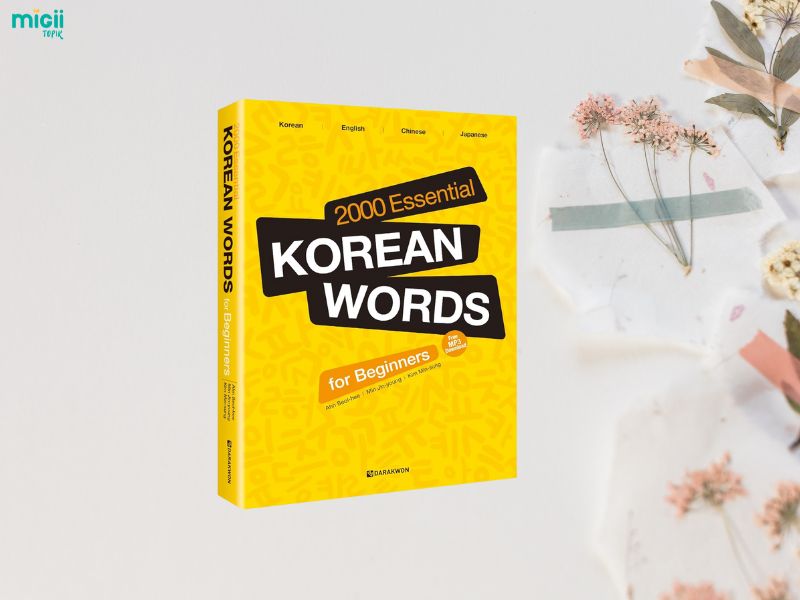
Build your TOPIK I vocabulary systematically with clear examples and real-life themes
Advantages:
• Covers all essential beginner-level vocabulary needed for TOPIK I preparation.
• Thematic organization helps learners remember words through familiar, everyday situations.
• Each entry includes examples and explanations that promote practical language use.
• Well-structured and easy to follow for self-learners.
Limitations:
• Does not include daily study plans or detailed review tests.
• Some sections are dense with text and may require active note-taking for best retention.
Many learners appreciate this book for its clarity, comprehensiveness, and real-world relevance. It is especially effective for those who want to build a solid foundation before progressing to intermediate-level TOPIK II study.
Master Korean Vocabulary for TOPIK I
This book is designed for beginners who are preparing for TOPIK I and want to strengthen their Korean vocabulary in an organized and practical way. It introduces essential words grouped by themes such as family, school, daily life, shopping, and health, helping learners build a strong foundation for real-world communication and the TOPIK exam. Each entry includes the Korean word, its English meaning, part of speech, and an example sentence showing how the word is used naturally in context.
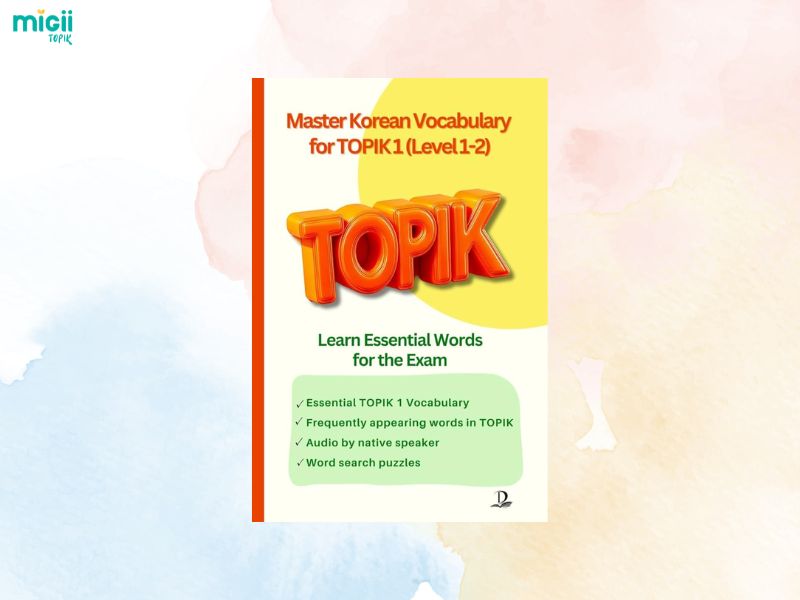
Build essential TOPIK I vocabulary through themed and practical learning
Advantages:
• Covers key beginner vocabulary frequently appearing in TOPIK I.
• Thematic organization makes learning intuitive and helps connect words to everyday situations.
• Includes clear translations and example sentences, ideal for self-learners.
• Compact and structured layout supports gradual, consistent study.
Limitations:
• Limited practice exercises for active recall, so learners may need to pair it with a workbook or app for review.
• Some sections focus mainly on word lists, which may feel repetitive for those who prefer interactive learning.
Many learners appreciate Master Korean Vocabulary for TOPIK 1 for its simplicity, clarity, and exam relevance. It is particularly recommended for beginners who prefer a structured approach and want to confidently progress from basic communication to TOPIK I test readiness.
TOPIK I Essential 1500 Words
This book compiles approximately 1,500 essential words that have frequently appeared in past TOPIK exams. The vocabulary is organized according to frequency, helping learners prioritize the most important words first. Short quizzes are provided to check understanding and support self-evaluation after each section.
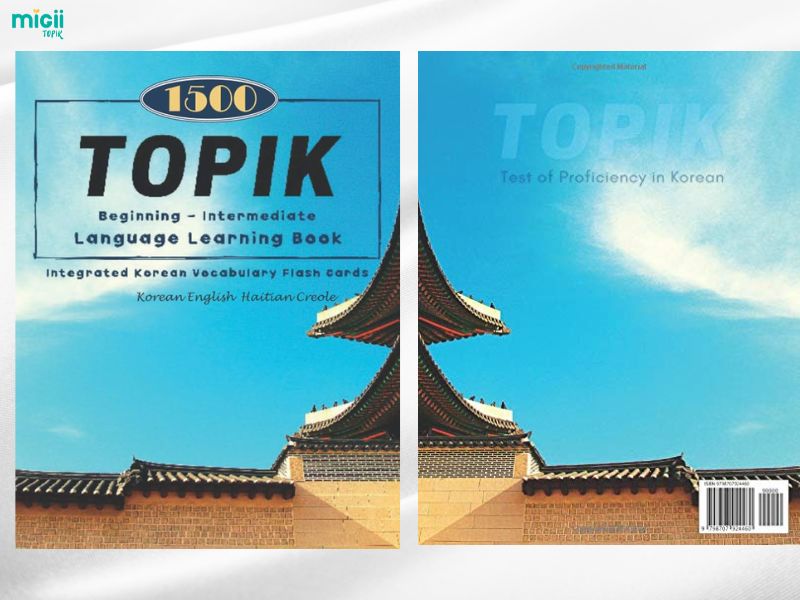
Master 1,500 essential Korean words frequently seen in past TOPIK exams
Advantages:
• Focuses on the most commonly tested and relevant vocabulary for TOPIK I.
• Mini quizzes help reinforce learning and track progress effectively.
• Prioritization by frequency ensures efficient study time management.
Limitations:
• Some editions do not include example sentences or detailed usage explanations.
• It may not be suitable for complete beginners who have not yet built a basic vocabulary base.
Many students appreciate how focused and efficient this book is for exam preparation. By concentrating on the most frequently tested words, learners often recognize a large portion of vocabulary in real exam questions, which boosts confidence and performance.
Best TOPIK Vocabulary Books for TOPIK II (Levels 3 – 6)
If you are preparing for TOPIK II (levels 3 – 6), these advanced vocabulary books will help you expand your word knowledge, understand formal expressions, and master the language used in academic and professional contexts.
TOPIK II Vocabulary in 50 Days
This book offers a structured 50-day plan designed specifically for learners at the intermediate to advanced levels. Each lesson introduces around 20 – 30 new words along with example sentences, short exercises, and review quizzes. It also includes vocabulary drawn from real TOPIK II exams, allowing learners to become familiar with the format and wording of actual test questions.
Advantages:
• Provides a clear daily study plan that supports consistent progress.
• Includes real test examples to build familiarity with exam-style vocabulary.
• Balanced between memorization and practical application through exercises.
Limitations:
• The daily workload may be challenging for those with limited study time.
• Some learners may need supplementary materials for grammar and reading practice.
Many students find this book highly effective for staying on track and building advanced vocabulary systematically. It is particularly valued by those who prefer a guided schedule before taking the official exam.
TOPIK II Vocabulary Master
This book focuses on thematic learning by dividing vocabulary into sections such as society, culture, economy, and environment. It goes beyond simple word lists by providing reading passages and practice questions that demonstrate how advanced vocabulary appears in real contexts. This approach helps learners not only memorize words but also understand how they are used in essays and news articles, which is an essential skill for the TOPIK II writing and reading sections.
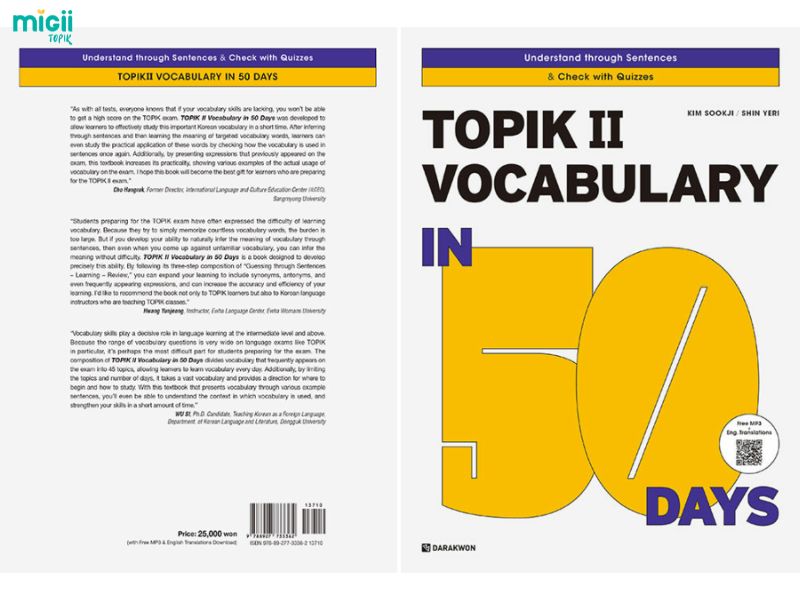
Learn advanced TOPIK II vocabulary in real contexts
Advantages:
• Thematic structure helps learners connect related vocabulary naturally.
• Reading passages improve both vocabulary retention and comprehension skills.
• Suitable for learners aiming for higher proficiency levels (4–6).
Limitations:
• Some sections may contain challenging or less frequently used academic terms.
• It may require a solid foundation in grammar and sentence structure to fully benefit from the content.
Advanced learners appreciate this book for its real-life reading integration and contextual explanations. It provides a well-rounded learning experience that prepares them for the analytical nature of TOPIK II.
FAST PASS TOPIK II: Vocabulary from Past Exams (기출 어휘)
This book focuses on vocabulary directly extracted from past TOPIK II exams, making it one of the most efficient resources for intermediate to advanced learners. Designed for those aiming for TOPIK Levels 3 – 6, it compiles frequently appearing words, idiomatic expressions, and grammar-related vocabulary often found in reading and writing sections. Each unit introduces key words, example sentences, and short practice exercises that help learners review in a focused, exam-oriented way.
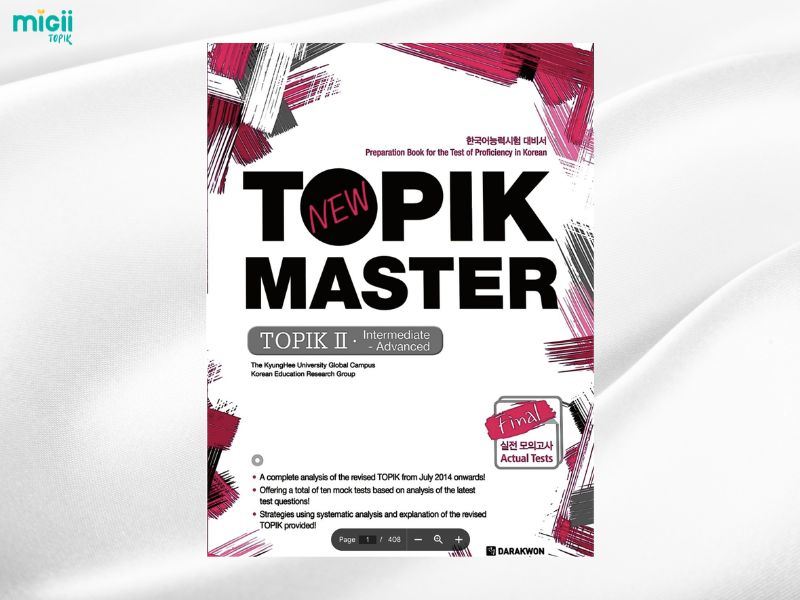
Review real TOPIK II vocabulary with words taken from past exams
Advantages:
• Draws from real past exam questions, ensuring high test relevance.
• Compact and structured design suitable for intensive short-term study.
• Example sentences reflect formal and academic Korean, improving both comprehension and writing.
Limitations:
• Brief explanations may be challenging for beginners without a grammar foundation.
• Lacks long-form exercises or extended reading passages for full context.
Many learners find this book effective for quick vocabulary reinforcement before the test. It’s especially useful for advanced students who already know basic grammar and want to polish their vocabulary based on actual exam trends.
Combined or All-Level TOPIK Vocabulary Books
If you want a single resource that can guide you from beginner to advanced levels, these all-level TOPIK vocabulary books are ideal. They cover both TOPIK I and TOPIK II, helping learners study progressively from everyday vocabulary to academic and professional terms.
TOPIK 6000 Words (All Levels)
This is one of the most comprehensive vocabulary collections available for TOPIK learners. It includes around 6,000 words commonly tested across both TOPIK I and TOPIK II, arranged by frequency and level. Each word is accompanied by definitions, example sentences, and sometimes synonyms to clarify meaning and context.
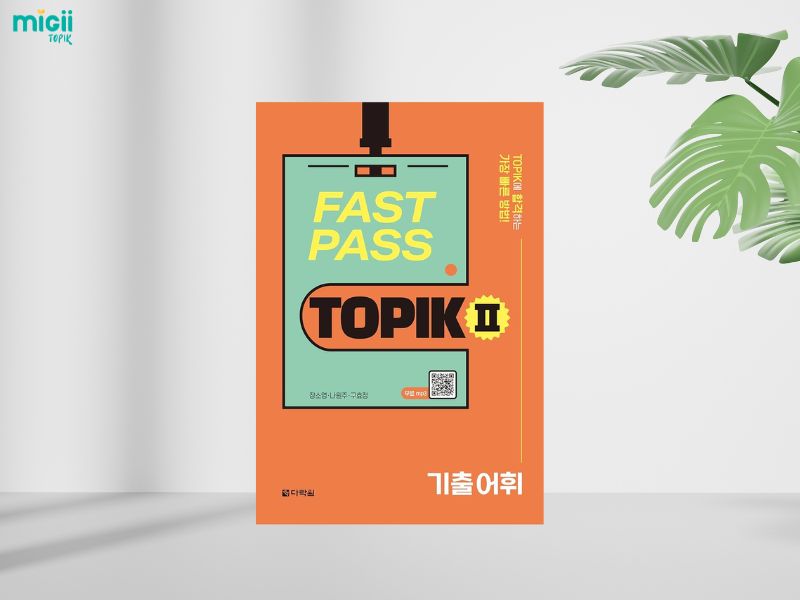
A 6,000-word collection for all TOPIK levels
Advantages:
• Covers the full range of vocabulary from beginner to advanced.
• Frequency-based structure helps learners prioritize essential words.
• Suitable for long-term study and review.
Limitations:
• The size of the list may feel overwhelming without a study plan.
• Limited contextual explanations in some editions.
Many students use this book as their main long-term reference guide. It is especially useful for self-learners who prefer to progress steadily through different levels while keeping all vocabulary in one place.
TOPIK in 30 Days: Intermediate Vocabulary
TOPIK in 30 Days: Intermediate Vocabulary is a focused study guide that helps learners master over 2,200 essential words that frequently appear in the TOPIK II exam. Designed for intermediate learners (Levels 3 – 4), the book provides a 30-day plan, introducing manageable word lists each day alongside example sentences, grammar notes, and short practice questions.
Each chapter is structured for gradual progress, combining reading, writing, and listening components to reinforce retention. It also includes a self-vocabulary booklet and downloadable MP3 files, allowing learners to review pronunciation and meanings anywhere.
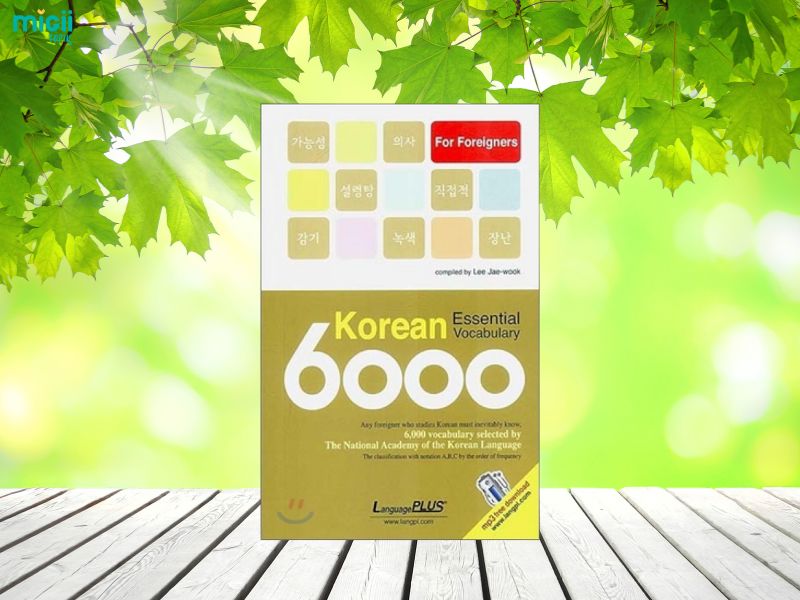
Master 2,200 key TOPIK II words in 30 days with structured lessons and audio support
Advantages:
• Clear 30-day schedule ideal for short-term exam preparation.
• Includes example sentences, grammar tips, and mini quizzes for reinforcement.
• Comes with an MP3 audio file and self-review booklet for listening and repetition practice.
• Covers high-frequency vocabulary directly drawn from past TOPIK exams.
Limitations:
• The daily load can be demanding for those with limited study time.
• Focuses mainly on vocabulary and may need to be paired with grammar or reading resources for a full preparation plan.
Many learners appreciate the well-paced structure and real exam relevance of this book. It’s especially recommended for students who want to prepare efficiently within a month and prefer a guided, consistent study routine.
Complete TOPIK II with One Book for Intermediate to Advanced Level
This book presents a frequency-based approach to learning advanced Korean vocabulary for TOPIK II (levels 3 – 6). It compiles thousands of words sourced from past exams and authentic language materials, arranging them by usage frequency to help learners focus on the most important words first.
Each entry includes definitions, part of speech information, example sentences, and related terms such as synonyms and antonyms. The inclusion of reading passages and practice questions allows learners to see how vocabulary is applied in real contexts, making it a valuable study tool for both reading and writing sections.
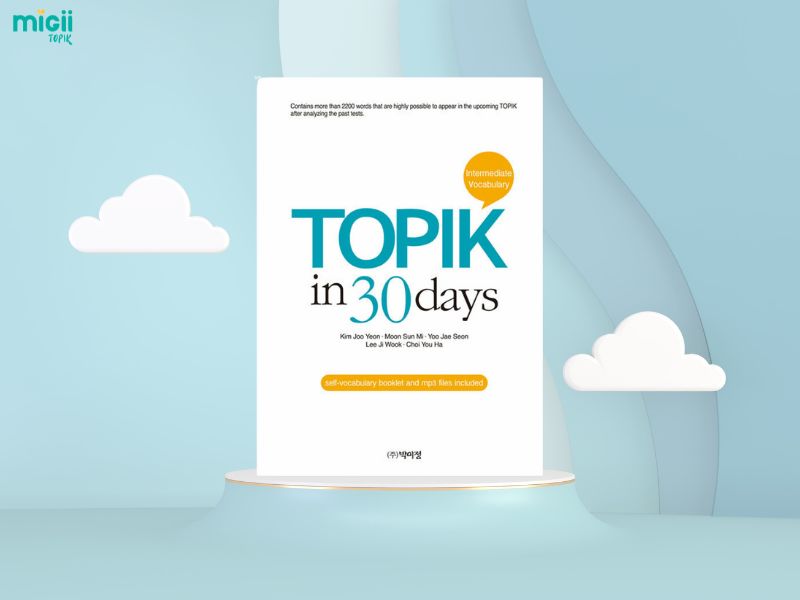
Master TOPIK II vocabulary with a frequency-based guide
Advantages:
• Frequency-based structure prioritizes essential vocabulary used in the exam.
• Includes contextual examples, reading exercises, and related words for deeper understanding.
• Ideal for structured, systematic learning from intermediate to advanced levels.
Limitations:
• The large amount of vocabulary may be overwhelming without a clear study plan.
• Some advanced terms lack detailed explanations for nuanced meanings.
Many learners appreciate this book for its organized frequency-based layout and strong connection to real TOPIK exam content. It is especially recommended for TOPIK II candidates aiming for Level 5–6 who want to expand their academic vocabulary and strengthen comprehension skills through real-text practice.
My First 500 Korean Words for TOPIK
Published by Talk To Me In Korean, this book introduces beginners to their first 500 Korean words through a combination of illustrations, example sentences, and cultural notes. Each word is presented in context, showing how it can be used in simple conversations and short paragraphs.
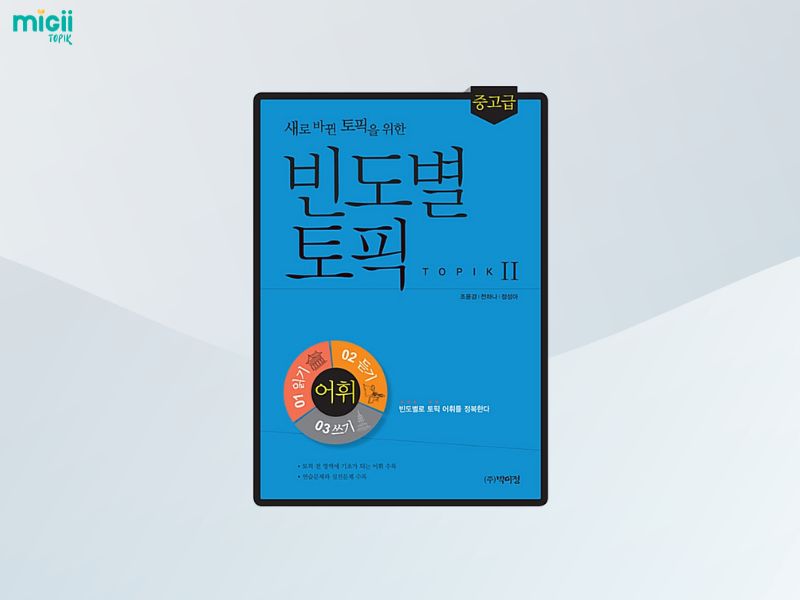
Learn your first 500 Korean words with visuals and real-life examples
Advantages:
• Fun and engaging with colorful illustrations.
• Provides clear usage examples and cultural explanations.
• Great introduction for absolute beginners preparing for TOPIK I.
Limitations:
• Covers only beginner-level vocabulary, so learners will need follow-up materials for higher levels.
• Focuses more on everyday language than exam-specific terms.
Beginners love this book for its friendly tone and visual design. It makes Korean vocabulary feel approachable and memorable, which helps build confidence before moving on to more advanced study materials.
Tips to use your TOPIK vocabulary book effectively
A TOPIK vocabulary book works best when paired with smart study habits. To remember words longer and learn more effectively, try these practical tips:
- Set a daily word goal and review regularly: Decide how many words you want to learn each day, for example 20 to 30, and spend a few minutes reviewing the previous day’s vocabulary before moving on to new ones. Regular repetition helps strengthen memory and improve recall.
- Use flashcards to reinforce learning: You can create your own physical flashcards or use digital ones to test yourself. For digital practice, Migii offers an excellent platform where you can review vocabulary through interactive quizzes and spaced repetition exercises tailored for both TOPIK I and TOPIK II.
- Write example sentences for every few new words: Try using 5 – 10 new words in your own sentences. Writing helps you understand how words function grammatically and ensures you remember them in real context rather than in isolation.
- Combine book study with listening and writing practice: Read aloud your new words to improve pronunciation, listen to short dialogues or podcasts using similar vocabulary, and practice writing short paragraphs or diary entries using the new words you’ve learned.
- Check your progress regularly: Take short vocabulary quizzes on Migii to evaluate how well you remember each set of words. This helps identify weak areas and keeps your study sessions more focused.
Conclusion
Choosing a TOPIK vocabulary book that matches your level and learning style is key to effective preparation. Stay consistent, review regularly, and practice using new words in real situations to build lasting progress. To make studying easier and more engaging, use Migii for interactive quizzes and smart vocabulary review. With the right book and Migii’s support, you can confidently strengthen your Korean skills and move closer to your TOPIK goals.
